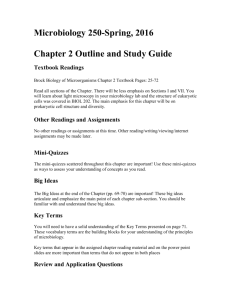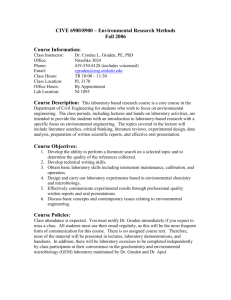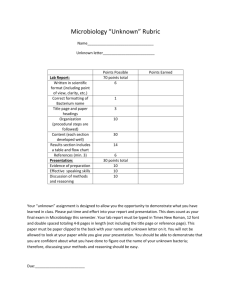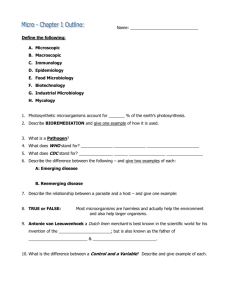Applied Microbiology
advertisement
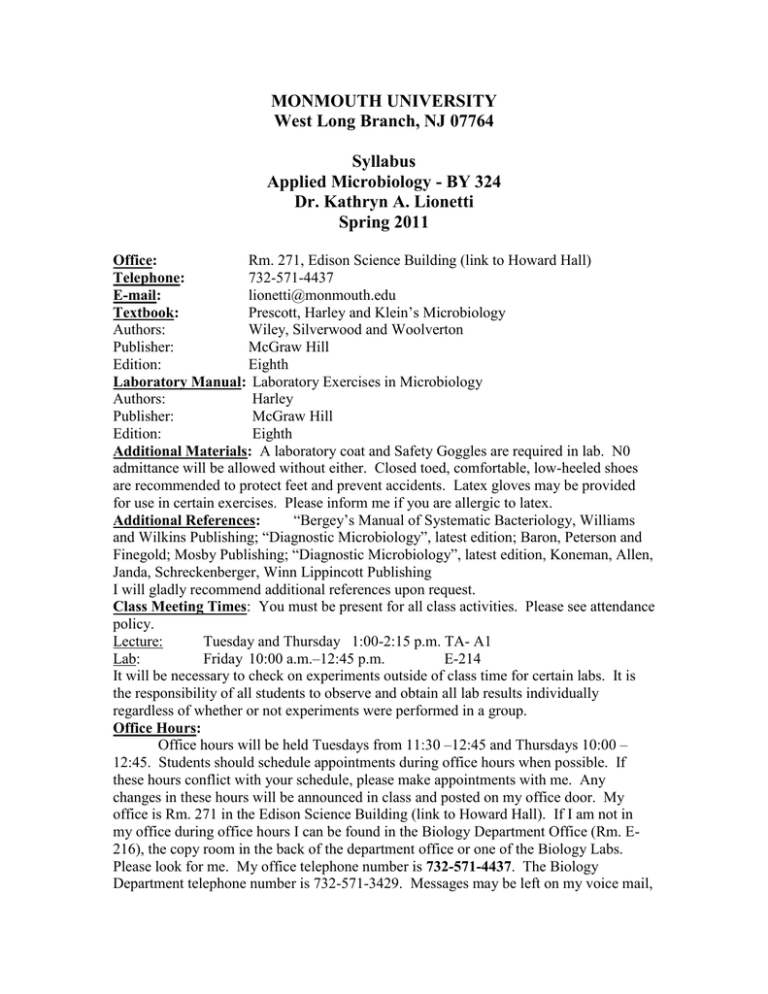
MONMOUTH UNIVERSITY West Long Branch, NJ 07764 Syllabus Applied Microbiology - BY 324 Dr. Kathryn A. Lionetti Spring 2011 Office: Rm. 271, Edison Science Building (link to Howard Hall) Telephone: 732-571-4437 E-mail: lionetti@monmouth.edu Textbook: Prescott, Harley and Klein’s Microbiology Authors: Wiley, Silverwood and Woolverton Publisher: McGraw Hill Edition: Eighth Laboratory Manual: Laboratory Exercises in Microbiology Authors: Harley Publisher: McGraw Hill Edition: Eighth Additional Materials: A laboratory coat and Safety Goggles are required in lab. N0 admittance will be allowed without either. Closed toed, comfortable, low-heeled shoes are recommended to protect feet and prevent accidents. Latex gloves may be provided for use in certain exercises. Please inform me if you are allergic to latex. Additional References: “Bergey’s Manual of Systematic Bacteriology, Williams and Wilkins Publishing; “Diagnostic Microbiology”, latest edition; Baron, Peterson and Finegold; Mosby Publishing; “Diagnostic Microbiology”, latest edition, Koneman, Allen, Janda, Schreckenberger, Winn Lippincott Publishing I will gladly recommend additional references upon request. Class Meeting Times: You must be present for all class activities. Please see attendance policy. Lecture: Tuesday and Thursday 1:00-2:15 p.m. TA- A1 Lab: Friday 10:00 a.m.–12:45 p.m. E-214 It will be necessary to check on experiments outside of class time for certain labs. It is the responsibility of all students to observe and obtain all lab results individually regardless of whether or not experiments were performed in a group. Office Hours: Office hours will be held Tuesdays from 11:30 –12:45 and Thursdays 10:00 – 12:45. Students should schedule appointments during office hours when possible. If these hours conflict with your schedule, please make appointments with me. Any changes in these hours will be announced in class and posted on my office door. My office is Rm. 271 in the Edison Science Building (link to Howard Hall). If I am not in my office during office hours I can be found in the Biology Department Office (Rm. E216), the copy room in the back of the department office or one of the Biology Labs. Please look for me. My office telephone number is 732-571-4437. The Biology Department telephone number is 732-571-3429. Messages may be left on my voice mail, e-mail (lionetti@monmouth.edu), with the Department Secretary, or on the Biology Department answering machine. The Office of the Dean of the School Science may also be contacted for messages if necessary (732-571-3421). Students are encouraged to attend office hours. If you feel you need help beyond office hours, please discuss this with me. Catalog Description: Microorganisms of food, water, soil, dairy products, industrial processes, disease and genetic engineering Prerequisites: BY 223 with a grade of C- or better. Failure to complete this prerequisite will most likely result in difficulty and a lower grade in this course. Please see me if this is the case. Expected Clientele: Biology and Medical Technology majors, Pre-health professional students Objectives: 1. To acquaint students with the various fields in microbiology including genetic engineering, the process of infection and disease, immunology, medical microbiology, microbiology of soil, water and food and appropriate laboratory techniques.. 2. To promote awareness and sensitivity to the social and ethical aspects associated with microbiology. 3. To promote an appreciation for and awareness of the process of scientific research which forms the basis of what is known about microbiology and what will be learned in the future of microbiology. 4. To promote critical thinking in the sciences. Evaluation: 3 lecture exams worth 175 points each 525 points Laboratory (including unknown identification, Lab reports and written assignments) 200 points Virus Presentation 50 points Hot Topic – 9 weeks @5 pts per week 45 points Final exam 180 points 1000 points Attendance may also affect a student’s grade. (See attendance policy). Adjustments in the evaluation criteria may be made as deemed necessary by the professor. The following scale will be used to determine grades: Letter Grade A AB+ B BC+ C CD+ D DF % of Points 93 and above 90-92 87-89 83-86 80-82 77-79 73-76 70-72 67-69 63-66 60-62 59 and below Final Grade 930 and above 900-929 870-899 830-869 800-829 770-799 730-769 700-729 670-699 630-669 600-629 599 and below Assignments: All assignments will be announced in class. It is the responsibility of the student to note assignments and their due dates. Assignments must be handed in at the beginning of the class or lab period. Assignments will be accepted after their due dates only in extreme circumstances and substantial documentation must be provided. Late assignments will be subject to a reduction in grade. Students may not miss class in order to complete assignments. Students are expected to attend class the day an assignment is due, otherwise the assignment will not be accepted without proper documentation for a legitimate (as judged by the professor) excuse. It is expected that proper English will be used when completing assignments. Printing of assignments should not be done on the same day the assignment is due since printer problems may arise. Printer problems are not an excuse for an assignment being handed in late. Students may not e-mail assignments to the professor without receiving prior approval of the professor and there must be a legitimate, as judged by the professor, reason. This may only be done in an emergency and only for assignments which may be submitted completely via e-mail. E-mail problems occasionally arise and are not an excuse for an assignment being late. It is the student’s responsibility to confirm with the professor that the e-mail was received. Unstapled assignments will not be accepted. All assignments and exams are to be completed completely independently and without sharing of any information or any electronic file. Plagiarism will not be tolerated. Assignments that bear significant resemblance to one another, as judged by the professor, will be given a zero and students will be reported to the Disciplinary Committee. (See the “Academic Dishonesty” section). Students should review the Academic Dishonesty section below before preparing each assignment. Assignments for excused absences may not be allowed the same amount of time as others for completion. Such assignments may be of a different nature than the regularly scheduled assignment. All lab exercises must be completed otherwise the student will receive a deduction of points, which will be at the discretion of the professor. If there are significant writing problems, assignments may be handed back to students to be corrected and resubmitted by a specified date. A loss of points will accompany such assignments. In such cases, students are strongly encouraged to enlist the help of the Writing Center. Students should review the academic dishonesty section below before preparing each assignment. All lab exercises must be completed otherwise the student will receive a deduction of points which will be at the discretion of the professor. The Identification of the Unknown Bacterium report must be retained by the students for their portfolios. Attendance Policy: Attendance and punctuality are mandatory in this course and will influence your final grade. You are expected to be present for all class activities. It is understood that illness, bereavement and other problems occasionally necessitate absence from class. Any such absences will be excused if satisfactory documentation is provided no longer than one week after the absence. Vacations and the like are not satisfactory excuses for missing an exam, class or lab. Unexcused laboratory absences will result in a deduction of 100 points from the student’s total number of points for the course. Students’ unexcused lecture absences may also result in a deduction of points. The number of points for lecture absences will be at the discretion of the professor. Absence from an exam will result in an automatic zero grade for that test. Make-up exams are allowed only in the most extreme circumstances and substantial documentation of a legitimate reason for missing the exam must be provided. Makeup exams will be of a different format (e.g.- oral) than regularly scheduled exams in most cases. If you miss an exam, you must contact the professor immediately. Documentation must be provided as soon as possible after the missed exam and no later than one week otherwise the student will forfeit the right to a make-up exam. This holds true for missed labs as well. Absences are expected to be accompanied by an appropriate source of communication, such as e-mail or a phone call, the day the absence occurs. Professional conduct is expected at all times. Cell phone text messaging is not permitted during class or lab. Cell phones may be left on and set on vibrate only if a student is an emergency contact for someone. Only emergency conversations can be held during class or lab time. If an emergency conversation must take place during class or lab time, the student must exit the room and speak with the professor after class. Appropriate consequences which will include removal from the classroom and a deduction of points will occur if behavior is a problem. Additional consequences may be applied. Refer to the statement on civility and code of conduct in the student handbook. Lateness – You are expected to be on time for all lectures, exams and labs. Points will be deducted from your total for lateness. Material will not be explained again to you. It is your responsibility to see that you are not marked absent. If you are marked absent and you have come in late and have not checked to see if you have been marked absent, you will be deducted the same number of points as if you were absent. A student arriving late shall not disrupt the professor or classmates. If you cannot meet the attendance policy, you should drop the course now. Monmouth University Health Services Policy on Medical Excuse Notes: A medical excuse note will be given to students only if they are seen and evaluated by a licensed practitioner and deemed to be medically excused from classes. (Students cannot obtain an excuse note by walking into the Health Services office without being seen by a licensed practitioner and without being medically excused from class.) Excuse notes for work-related absences will not be provided by the Health Services Office. Students may be seen by a clinician at the Health Center or provide Health Services with written documentation from an outside practitioner. Prolonged Absences - Three or More Days: Students are to notify Health Services in the event of a valid absence from classes for three or more days. Health Services will notify professors of the expected absence due to illness or surgery and the anticipated length of time. Specific details are not released to faculty members due to confidentiality of medical information. Students are expected to contact their professors regarding missed assignments. Students Who Need Accommodations: Students with disabilities who need special accommodations for this class are encouraged to meet with me, or the appropriate disability service provider on campus, as soon as possible. In order to receive accommodations, students must be registered with the appropriate disability service provider on campus as set forth in the student handbook and must follow the university procedure for self-disclosure, which is stated in the University Guide to Services and Accommodations for Students with Disabilities. Students will not be afforded any special accommodations for academic work completed prior to the disclosure of the disability. Students will not be afforded any special accommodations for academic work completed prior to the completion of the documentation process with the appropriate disability service office. Ample time (two weeks) must be allowed in order for special accommodations to be provided. Academic Dishonesty: Cheating and plagiarism (looking at someone else’s exam, copying or sharing information from someone else’s exam, assignment or lab report, preparing an assignment or lab report with someone else or with the assistance of someone else, sharing any kind of electronic file, using unoriginal materials for slide presentations, falsifying laboratory data, using the data obtained by someone else without personally obtaining the data, failure to properly cite literature used including that from the internet, etc.) are unacceptable and will be penalized. All graded assessments including assignments, graded lab work and exams and quizzes are to be completed without the aid of others. (For example there is to be no collaboration when writing a lab report and no student aid in focusing the microscope when viewing specimens.) Make sure you read “Monmouth University Student and Residential Life Handbook” for explanations of academic dishonesty and cheating and plagiarism. Make sure you pay particular attention to the academic dishonesty and student code of conduct sections. Cheating and/or plagiarism will result in zero points for that assignment or exam and/or failure for the course. This decision is made by the professor. If you are unclear about anything pertaining to this issue you must ask the professor for clarification. Claims of ignorance of any kind will not be valid excuses for violation of these policies. Students are not permitted to use any recording device including digital cameras or audio recorders unless it is deemed necessary with the Office of Disability Services in conjunction with the professor. Use of such devices will be subject to academic dishonesty policies. Students may be asked to move their seating arrangements before or during an exam. All books, papers, calculators, backpacks, etc. must be placed in the back or sides of the room before an exam begins. Baseball caps and other brimmed hats must be removed or turned backwards during exams. Failure to comply will result in a zero grade for that exam. Students must abide by the following statements as they submit all exams and lab assignments: "Examination Rules: No student is permitted to have at his or her desk any books or papers that are not given out or expressly permitted by the instructor. Possession of such material will be regarded as evidence of intent to use the information dishonestly. No communication between students during the examination is permitted. If there are questions, or if there is a need for additional material, the instructor should be asked. If there is a need for calculations or notes, they may be written on the pages of the exam. The following pledge is agreed to when taking any examination: I, ___________________, certify that I have read the above rules for examinations, and that I have abided by them. By signing, I affirm that I have neither given nor received aid during this examination, and I understand that violation of this affirmation may result in suspension or expulsion from Monmouth University." Students must obtain results from their own laboratory work. Students attempting to obtain results of others will fail the course and be subject to additional penalties including dismissal from the University. All students must view laboratory results and collect data independently. Data may not be obtained from anyone. Collaboration on group work ends after the lab work has been set up. Students not participating equally within a group when setting up an experiment will have a significant number of points deducted from their total. The number of points is at the discretion of the professor. Students falsifying results will be subject to the same penalties. Note to Students: Because of the nature of the Microbiology Laboratory, students will be expected to check on certain experiments outside of the scheduled laboratory time. Students may not work in the laboratory outside of the regularly scheduled laboratory hours without consent of the professor and without a faculty member present. Arrangements to work in the lab outside of regularly scheduled lab hours must be made in advance. Colorblind students should inform the professor immediately so that appropriate arrangements for certain labs may be made. Students should save all exams, quizzes and assignments since these will aid in future studying during the semester. Students must abide strictly by the laboratory rules that are provided in written form during the first laboratory session and are posted in the lab. Students must sign a form stating that they understand and will follow these rules. No student may perform laboratory work unless this form has been signed and received by me. Failure to comply with laboratory safety rules will result in immediate dismissal and either a 100-point deduction or failure for the course. This decision is at the discretion of the professor. This document and what it represents is subject to change without recourse. Adjustments to this syllabus may be deemed necessary by the instructor and will be announced to students. It is the student’s responsibility to note such changes. Program Changes: Spring Recess: Last Day to Withdraw: Last Day of Classes: Tuesday, January 18th – Tuesday, January 25th Monday, March 7th – Friday, March 11th Monday, March 28th Monday, May 2nd Applied Microbiology - BY 324 – Lecture Outline Check e-campus prior to attending each lecture. Reading Assignment Lecture Topic Orientation to the course, Overview of Applied Microbiology Recombinant DNA Technology Ch. 15 Microbial Genomics Ch. 16 Microbial Taxonomy Ch. 17 Archaea and Bacteria Ch. 18, 19, 20, 21, 22 Normal Microbiota and Nonspecific Immunity Ch. 30, 31, 32 Specific Immunity Ch. 33 Pathogenicity of Microorganisms Ch. 31 Clinical Microbiology & Clinical Immunology Ch. 35 The Epidemiology of Infectious Disease Ch. 36 Human Diseases Caused By Bacteria Ch. 38 Human Diseases Caused By Viruses Ch. 37 (refer to Ch. 5, 25) Human Diseases Caused By Fungi and Protozoa Ch. 39 Microorganism Interactions and Microbial Ecology Ch. 27 Microorganisms in Aquatic Environments Ch. 28 Microorganisms in Terrestrial Environments Ch. 29 Applied Environmental Microbiology Ch. 42 Microbiology of Food Ch. 40 Industrial Microbiology and Biotechnology Ch. 41 Approx. # of lectures ½ 2 ½ 1½ 3½ 2 2½ 1 ½ 1 3 1 1 1½ ½ ½ 1 ½ 1 Exam/Presentation Dates Exam 1 Exam 2 First Set of Presentations Exam 3 Second Set of Presentations Tuesday, February 15th Tuesday, March 22nd Friday April 15th Tuesday, April 19th Friday, April 29th These dates are subject to change. Changes will be announced in class and it is the student’s responsibility to note changes. Laboratory Schedule Read the lab manual and handouts and check e-campus prior to attending lab each week. Dates Lab Exercise 1/21 Orientation to the Lab, Lab Safety Rules, Review of Sterile Technique, Review of Gram Stain – Exercise 8 1/28 DNA Fingerprinting – Restriction Digest (handout), Bacterial Protein Profiles (handout) 2/4 DNA Fingerprinting (continued) – Agarose Gel Electrophoresis, Winogradsky Column Setup (handout), Nitrogen Fixation Setup - planting (handout) 2/11 Selective and Differential Media, Gram Positive Cocci – Ex. 28,29,54,55,56, furazolidone, salt tolerance, PYR test, bile solubility, staph ID (handouts) 2/18 Gram Negative Bacilli – Ex. 20, 21, 24, 25, 30, 31, 32, 33, 34 2/25 Analysis of Gram Positive Cocci and Gram Negative Bacilli, Rapid Multitest Systems – Ex. 36; ABO Blood Typing (handout); Ouchterlony Analysis: Antigen-Antibody Precipitation (handout) 3/4 ELISA – EBV, Clinical Diagnostic Immunoblot (handouts) 3/11 NO LAB – SPRING BREAK 3/18 Assignment of Unknown Bacteria 3/25 Unknown Identification 4/1 Microbiology of Soil – Microbial Cycling of Nitrogen - handout 4/8 Microbiology of Water – Standard Coliform MPN Test – Ex. 46, Membrane Filter Technique for Coliforms and Fecal Streptococci – Ex 47, MUG test – refer to Ex. 46 4/15 Virus Presentations - Food Preservatives – chemical preservatives and spices (handout), 4/22 Food Microbiology (handout)/ Analysis of Winogradsky Column, Analysis of Nitrogen Fixation – Examination of Clover and Rhizobium (Examination of Milk for Bacteria – handout and Ex. 51, Bacterial Counts of Selected Food Products – Ex. 50) 4/29 Virus Presentations This lab syllabus is subject to change. Changes will be announced in lecture. I have read and understand the Spring 2011 syllabus for BY 324, Applied Microbiology. I understand the policies, procedures and consequences described in the syllabus. Name (printed) _______________________________________ Signature ___________________________________________ Date _______________________________________________
